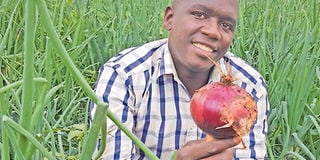Young man feeding the military

Martin Gathogo inside one of his two onion greenhouses in Gilgil. The farmer emerged third in the small-scale fully commercialised farm category in this year's National Farmers Award Scheme. PHOTO | RACHEL KIBUI | NMG
What you need to know:
- The factory was officially launched by President Uhuru Kenyatta last month and being a food supplier, Gathogo was among those invited to attend.
- On one section of the farm, there is a plantation of spinach, another section hosts onions inside a greenhouse and he also produces honey.
- The onions are in two greenhouses, each measuring 50 by 100 feet. From each greenhouse, Gathogo harvests at least five tonnes of onions.
- Jeff Kahuho, a programmes manager at Participatory Ecological Land Use Management (PELUM, Kenya), based in Thika, noted that having a ready market offers a farmer a huge boost.
Dressed in a grey trouser and a matching shirt, farmer Martin Gathogo, driving a pickup truck stops at the Kenya Armed Forces food processing plant in Gilgil.
He walks in and exchanges pleasantries with an attendant and then walks out.
“This is a newly established processing plant,” he says. “I am one of the suppliers here. I have been selling my produce here since April,” he adds.
The factory was officially launched by President Uhuru Kenyatta last month and being a food supplier, Gathogo was among those invited to attend,
“I shook the President’s hand, and he told me to continue with the good work and thanked me for being a reliable supplier,” he recalls.
Being a military establishment, becoming a food supplier at the facility is certainly not an easy task and one may wonder how Gathogo, 38, did it. It becomes clearer when we drive six kilometres away to his Unloi Farm
On one section of the farm, there is a plantation of spinach, another section hosts onions inside a greenhouse and he also produces honey.
For spinach, I plant them in shallow holes that measure one by one metre.
“In each hole, I plant 20 crops after mixing soil with organic manure, which I get from my 20 dairy cows,” says Gathogo.
This method of planting, according to him, enables the plants to shield each other from the scotching sun, therefore, he only needs to irrigate them at most twice weekly.
He also plants in similar fashion other vegetables such as cabbages. From an acre of spinach, he harvests about 10 tonnes of produce and sells a kilo at Sh25.
“I supply half a tonne of spinach to the facility monthly and three-four tonnes of onions in the same period.”
FORMER FREELANCE PHOTOGRAPHER
The onions are in two greenhouses, each measuring 50 by 100 feet. From each greenhouse, Gathogo harvests at least five tonnes of onions.
“I sell a kilo of onions at between Sh60-Sh80, depending on demand and supply,” says Gathogo, who recently emerged third in the small-scale fully commercialised farm category in the National Farmers Award Scheme sponsored by the Ministry of Agriculture and Elgon Kenya.
Besides the army, traders also flock his farm to buy produce in wholesale and resell in Gilgil and in Naivasha.
Gathogo, who farms on part of his 30 acres, gets water from River Morendat that crosses the land.
He is, however, sinking a borehole so that he can be assured of water supply as his agribusiness expands.
Along the river, an innovative Gathogo has put up 120 beehives, with the area being suitable for beekeeping due to flower-rich plants. “From each hive, I get about 10-13kg of honey every three to four months,” says Gathogo, adding that he sells a kilo in Gilgil at Sh1,000.
He started farming in 2000 when he bought his first cow at Sh20,000. A former freelance photographer, later bought a 50 by 100 feet plot from his cousin, where he put up a greenhouse and planted tomatoes. His investment was about Sh80,000.
Since then, he has continued to increase his acreage, but would sell to brokers before he began supplying to the army.
“The fact that I have a ready market not only motivates me, but also saves me the headache of dealing with brokers.”
Jeff Kahuho, a programmes manager at Participatory Ecological Land Use Management (PELUM, Kenya), based in Thika, noted that having a ready market offers a farmer a huge boost.
“A processor is a niche market and there are standards one is supposed to maintain which must be adhered to. As a small farmer, such a market offers one a chance to aggregate produce even from other farmers in cases of low supply and sell in high volumes,” he says.





